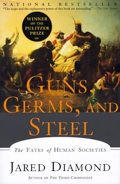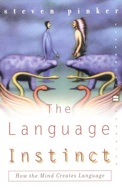Trond’s Favourite Books
[just a few so far, and many links still missing]

Trond’s Favourite Books
[just a few so far, and many links still missing]


I’ll be honest. I haven’t read all the books I recommend. And those I’ve read I have mostly only read parts of (there’s a few I’ve read in full, too...). Maybe I’m defending myself, but I’m not among those who look upon reading a book as a task that has to be completed and that is not completed until every single word is read. Books are sources of information, ideas and arguments. Sometimes I need to read ‘one long argument’ to get the point, other (most) times I’m fine with reading bits and pieces that interest me. Or, in reality, that’s mostly what I can afford time-wise. Often I get back to a book many times, sometimes reading the whole thing in the end. Maybe you have more time, patience or structure. Read your way. But read.
The list is incomplete, imbalanced and biased by personal opinion, liking and more or less accidental reading experiences. It will grow, shrink, and change over time. The list has no other aim than to attract attention to some books I have found interesting - or that I suspect are. I don’t necessarily agree with the authors - but that really doesn’t matter as long as they have interesting arguments to put forward...

Great Auk Islands: a Field Biologist in the Arctic
T. & A. D. Poyser, UK, 1993.
ISBN-10: 0856610771, ISBN-13: 9780856610776
This is a beautiful book. It is a wonderful combination of a very personal story about young Tim’s life as a guillemot field worker and student in the high Arctic, and at the same time an exciting and informative book about the behaviour and ecology of guillemots (and other seabirds). A very special book, and a personal favourite of mine. As the publisher Poyser doesn’t exist anymore (taken over by Academic Press, then by Elsevier), you may have to go via Amazon, eBay or similar to get hold of it. If you like seabirds, science, the Arctic & a good story, it’s more than worth the effort.
Watch Tim talk about «The Wisdom of Birds»

What We Believe but cannot Prove: Science in the Age of Certainty
Harper Perennial, 2006.
ISBN: 0060841818
This is a fun book, but at the same time very interesting. It sums up responses to the «Annual Question» (this time for 2005) of the Edge.org intellectual web site. The website’s (and book’s) editor John Brockman asked a selection of top intellectuals to answer on a few pages each (typically 1-4 pages, so a nice book to read piece by piece) exactly the question in the book’s tltle. I’m fascinated by the idea behind this book because it runs so dramatically counter to the fundamental principle that belief has no role in science - it should all be a matter of hard evidence and we should put our ideas to the most critical test... But then we all believe - there’s some hypotheses we simply think must be true & which we therefore put to a test - in practice we perhaps often seek confirmation rather than falsification. And there’s those things that we just think must be true even if they can’t be tested (now). (I, for one, believe that one main reason why men often end up in powerful positions in society is that they generally have a stronger, biologically founded, status-seeking drive. But I can’t see any way to prove it...). Of course, the bright minds of this book (including Pinker, Dennet, Dawkins, McEwan, etc etc) sometimes believe in quite big & thought-provoking things - and it’s in itself notable that all these eminent intellectuals really do believe (but they know the difference between belief and knowledge). A highly stimulating read! I recall the former editor of New Scientist believes that cockroaches have conscience....

Charles Darwin: Voyaging
Princeton University Press, 1996.
ISBN-13: 9780712673051, ISBN: 0712673059
Charles Darwin: The Power of Place
Princeton University Press, 2003
ISBN13: 978-0-691-11439-2
This two-volume masterpiece has been said by many to be the definitive Darwin biography. I’m probably not in the position to judge, but it certainly feels that way (haven’t yet read the volumes in full, but enough in both to be convinced). These books give you everything you’d ever want to know about Darwin (and to many, probably a bit more). They are beautifully written, and well worth spending time with if you’d like to understand not only how Darwin’s theory of evolution by natural selection came about, but also want to understand Darwin’s personal and scientific development, in the context of personality, private life & history, intellectual development and the time and society in which he lived. It shows you the full complexity of Darwin’s character, life and achievements. However, if this sounds like too much for you, a good start is Browne’s very brief but entertaining introduction to Darwin: «Darwin’s Origin of Species» (Atlantic Books, 2006, ISBN 10: 1400153883). Having read that one, maybe you find that you want more?
More books by Janet Browne

The Ant and the Peacock
Cambridge University Press, 1993
ISBN-13: 9780521457651, ISBN-10: 0521457653
History of evolutionary biology at its best. Cronin tackles the two big issues Darwin never managed to solve satisfactorily: sexual selection («The Peacock» - why females have a «sense of beauty», and altruism - why help others instead of reproducing («The Ant»). Cronin shows a deep understanding not only of the historical controversies and historical development in understanding these issues, but also of the core scientific problems inherent in each. She is as informed, and informative, about the current state of affairs (at the time of writing, some 15 years back) as she is about the scientific understanding and debate in Darwin’s time. A great read; enjoyable and deeply thought. A must for every student of sexual selection (and altruism, I guess, but that’s not my field). I’ve read somewhere that Gould attacked the «gene-centered argument» of the book, but I’m not so sure that tells anything negative about it.

The Descent of Man, and Selection in Relation to Sex
John Murray, London, 1871.
Facsimile reprint: Princeton University Press, 1981.
ISBN: 0-691-08278-2, 0-691-02369-7 (pbk)
Darwin’s 2nd most important book, and # 1 for those working with sexual selection. The bad thing about this book is that one starts to wonder what science has accomplished after Darwin..... He just got so many things right, and the book is so full of detailed empirical evidence (bordering boring in case of the bird chapter, but again you don’t need to read every word and Darwin was likely right when believing he needed to hammer his case in). I read this book while listening to Rolling Stones in my sleeping bag in a tent in the Antarctic... absolutely perfect. Darwin is not a difficult read once you get used the style, and his passion shines trough all the way. To be honest, I haven’t read the whole ‘Man part’ but this half is important not the least because, after having been very modest about man in the Origin, here he puts forward all the evidence that humans are apes and a product of evolution. Now he was ready for it, if not for the fight.
This book has been reprinted many times; the one I’ve indicated is a reprint of the 1st edition, with an introduction by John Tyler Bonner and Robert May.

The Ancestor’s Tale
Houghton Mifflin, 2005
ISBN13: 9780618619160, ISBN: 061861916X
In this book, Dawkins tells the story of evolution more than arguing the case for it, as he has done in so many other books. I really like it. Starting «on the top», with humans, Dawkins takes us down the tree of life and stops at each node where «our line» splits from lines leading to other kinds of creatures. The first stop is where we split from chimps some 6 mya, and from there we follow the route down through around 40 nodes until the origin of life. At each stop, Dawkins tells a ‘tale’ or two about central phenomena in evolution. This book is packed with information and is, like any Dawkins book, a very good read. It seems somewhat fashionable these days to be critical of Dawkins. I think he has done evolution - and science - enormous favours through popularizing the major ideas of evolution, and arguing the case for rationalism (I’m not taking a stand on religion here). There is no need to agree with every word Dawkins writes to appreciate his books. Personally, I love his prose - so clear, to the point, and musical. I also greatly respect his extreme integrity in arguing the case for (what be believes to be) the truth, entirely unaffected of whether it is politically correct and strategically wise. Dawkins is no opportunist. Whether or not one agrees with him I think every scientist should appreciate that.

Guns, Germs and Steel
Norton, 1997 (1st ed.)
ISBN 0-393-03891-2
This book tells the story of humankind from the domestication of the first animals and plants until today. Understandably controversial and at times maybe a bit speculative (I can’t really judge), I think this is my # 1 biology book - because it shows the immense power of biological knowledge in understanding the world, and the equally immense role of biology in shaping the world. If you are to read one book about biology, this is the one. There’s more than one edition; I don’t know if it has been revised or just reissued, though.
Diamond talk on why societies collapse

Dr Tatiana’s Sex Advice to All Creation
Henry Holt, 2003
ISBN: 9780099283751
Have fun with evolution & sexual selection! I know some have been critical about this book, but I think it is fantastic. In Dr Tatiana’s world, bugs and slugs and birds worry about their strange sexual habits and desires - «something must be wrong with me - what should I do?». Dr Tatiana’s advice: «Relax - it’s all only natural». The book is not only a very special and entertaining read; it also is a telling tale about the many surprising & interesting (& sometimes weird) adaptations shaped by sexual selection. If you ever doubted sexual selection was important, this book will settle the case (and give you a good laugh, too).
Olivia Judson’s column in New York Times

The Language Instinct
Originally published by William Morrow, 1994
2007 PS Edition: Harper Perennial Modern Classics
ISBN: 9780061336461; ISBN10: 0061336467 (2007 edition)
I haven’t read this book. That’s nothing I’m proud of. I should. It’s supposedly a very central book to read to understand the evolution of language, that most important of all human capacities. And a good read, too, if I’ve gotten it right. I’ve noted that at least one chapter is considered controversial, with some claiming that Pinker argues against a straw man position, but I think that’s a minor issue. This is a classic and I’ll have to read it.... The 2007 edition has additions on what has happened in the field between 1994 and 2007, and an FAQ section, among other things.